Scaling Immersive Fan Experience Revenues in the Premier League

Engaging the next generation of fans on their terms
The Premier League is a global phenomenon, captivating millions of fans worldwide.
To maintain this dominance and deepen fan engagement with a global footprint of digitally-native Gen Z and Alpha fans, clubs must rapidly embrace cutting-edge immersive technologies. Passive spectating is no longer enough. Today’s young fans crave interactive, personalized and shared experiences that extend beyond the stadium.
‘Harvest’ broadcasting media rights, rip up status quo with immersive experiences focus
The European sports rights market has low expectations for growth, impacted by recent economic, technology and Gen Z adoption factors. Pay-TV sports subscriptions have fallen into the non essential ‘luxury spend’ category, which is further compounded by the increasing seamless access for sports fans to stream live sport and highlights clips via free ‘unofficial or pirate’ channels.
Only 2% of UK sports rights holders expect media rights to deliver significant revenue growth in the near term. 1
The following 2024 market reflections from C-suite executives at UK sports organisations suggest major headwinds persist:
- 88% of C-suite executives admit they do not have a data strategy integrated into their business decision making 2 .
- 70% of sporting organisations do not have a digital strategy 3
- 50% concede to commercialising less than 10% of their known audience 4
The state of malaise across the European sports rights market is highlighted by the recent Premier League deal which achieved 3.5% revenue growth for its latest domestic cycle in return for providing an additional 35% more inventory. Expectations were so low, that this was regarded as a ‘positive success story’ when compared to similar sports rights deals for France’s Ligue 1 and Italy’s Serie A.
The European football sector is approaching an inflexion point where the over-reliance on media rights as the key driver for long-term revenue growth is waning. The market has reached a saturation point with its existing offerings and must now consider new, data-driven immersive levers and ecosystem partnerships for growth. However, there are significant hurdles in the short term to achieve value creation due to the lack of data and digital maturity in the industry.
The European football sector is approaching an inflexion point where the over-reliance on media rights as the key driver for long-term revenue growth is waning. The market has reached a saturation point with its existing offerings and must now consider new, data-driven immersive levers and ecosystem partnerships for growth. However, there are significant hurdles in the short term to achieve value creation due to the lack of data and digital maturity in the industry.
Technology is no longer the barrier: Immersive revenues will redefine premier league business cases within 2 years
Immersive Experiences has the potential to become a major revenue contributor by season ‘25-26 for the top Premier League clubs if the appropriate investments and prioritisations in Data Strategy, Data Security with SASE, Immersive Ecosystem partnerships, connectivity infrastructure investments and data-centric culture leadership mindsets are effectively adopted.
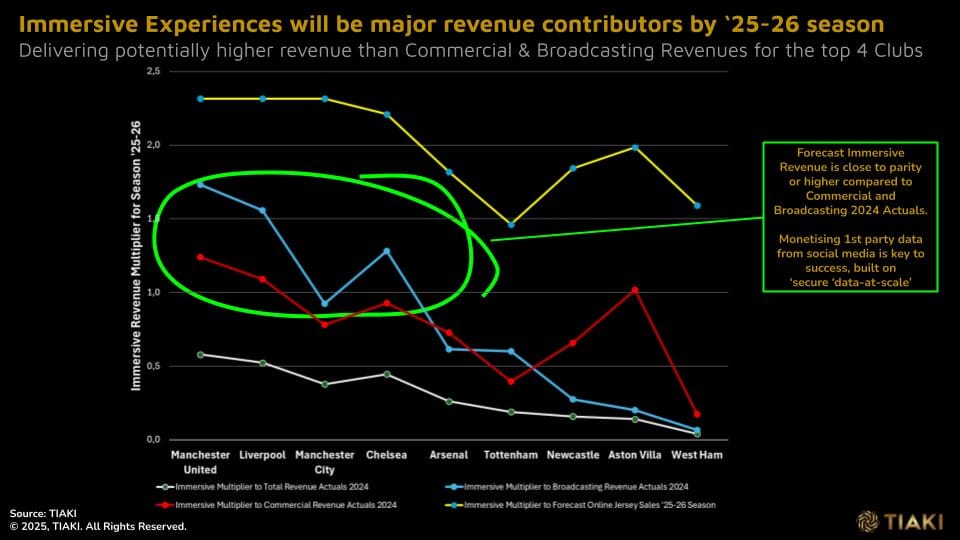
Sports properties need to become data centric organisations
Building an effective 1st party data strategy for digital fan growth is becoming foundational for success for leading sports franchises and clubs. One only needs to look at other sectors, such as Financial Services and Telco industries, to understand how they have spectacularly failed to develop deep meaningful, personalised relationships with their customers, despite sitting on vast quantities of transactional and location-specific conversation data. This reflects an inability to leverage data-at-scale from their legacy silos.
FC Barcelona remains one of the leading global football club brands on social media with 335 million followers. However, their recent €280 million sponsorship deal with Spotify failed to meet the music streaming brand’s expectations. The sponsorship collaboration provided Spotify with less than 1% of Barcelona’s followers in actual first party data for monetisation opportunities.
This highlights the reality gap which exists at many sporting organisations which is their inability to leverage 1st party data from their fan base of social media followers for monetisation and deeper, insightful engagement purposes. A customer lifetime value (CLV) centric mindset is not in place. This data immaturity is failing to meet expectations of fans, sponsors and private equity investors and also potentially undermines negotiation power in future sports media rights deals.
The data challenge is broader than simply how to improve harvesting existing 1st party data. A retailing data-driven personalisation mindset is needed to leverage anonymised 2nd party data from global players such as Google Audiences and synthetic data to create large volumes of sports fan personas for algorithmic learning. Only then will highly accurate, hyper-personalization marketing campaigns become credible for targeting new potential sports fans and assisting in retaining and engaging existing fans. Data-driven insights which enable the sports franchise to recognise, in advance, that a specific element of their fan base is at risk of disengagement, and then proactively address this with personalised campaigns to neutralise the churn risk, should become standard. This data-centric shift needs to be embraced quickly by the sports industry to drive stickiness, international growth and monetisation outcomes.
European football clubs dominate the global sports social media landscape yet value remains elusive
Globally recognised European football club brands dominate social media followers compared to sporting codes in North America or cricket and rugby codes.
Reflecting a truly global fan base, the leading football club is Real Madrid with 374 million followers across Instagram, X, YouTube, TikTok and Facebook. The trend continues with FC Barcelona 335 million, Manchester United 216 million and Manchester City 148 million followers in 2024 5 .
Yet this has not materialised in scaling new digital revenue streams from harvesting 1st party data. Let’s now examine the opportunity roadmap with data-driven, AI-powered immersive platforms.
The power of an immersive technology ecosystem
This briefing paper explores how a strategic partnership with immersive technology providers – Ethereal Engine, iR Studios, Zappar, Landvault, and Genius Sports – can revolutionize the fan experience and create ‘game-changing’ revenue growth by harvesting 1st party social media data:
- Ethereal Engine: Specializes in creating interactive 3D experiences for the web, enabling seamless integration of immersive elements into club websites and social media platforms.
- iR Studios: A leader in virtual and augmented reality experiences, capable of developing high-quality, immersive content for stadiums, fan zones, and digital platforms.
- Zappar: Pioneers in augmented reality technology, providing tools and platforms for creating engaging AR experiences that can be accessed through smartphones.
- Landvault: Focuses on spatial computing and digital twin technology, enabling the creation of interactive digital replicas of stadiums and training grounds.
- Genius Sports: A global leader in sports technology, providing data, content, and technology solutions to power immersive experiences with real-time data and insights.
The foundation: secure data-at-scale with SASE
Secure Access Service Edge (SASE) architecture is crucial for enabling the flow of data across the ecosystem. SASE provides:
- Consistent security policies: Enforces security measures across all network edges, protecting sensitive fan data.
- Scalability and flexibility: Adapts to the dynamic needs of immersive technologies, ensuring seamless data flow.
- Reduced latency: Minimizes delays in data transmission, essential for real-time, interactive experiences.
- Enhanced data analytics: Enables advanced analytics on fan behavior and preferences, powering personalized experiences.
Essential infrastructure: unlimited connectivity and wireless cameras
Private 5G SA or Wi-Fi 7: Provides high-bandwidth, low-latency connectivity within stadiums, ensuring smooth operation of immersive applications and seamless data transfer.
Wireless smartphone cameras: Enable fans to capture and share their own immersive experiences, fostering a sense of community and generating valuable user-generated content.
20 Immersive football fan experiences for the Premier League (Teenager Focus)
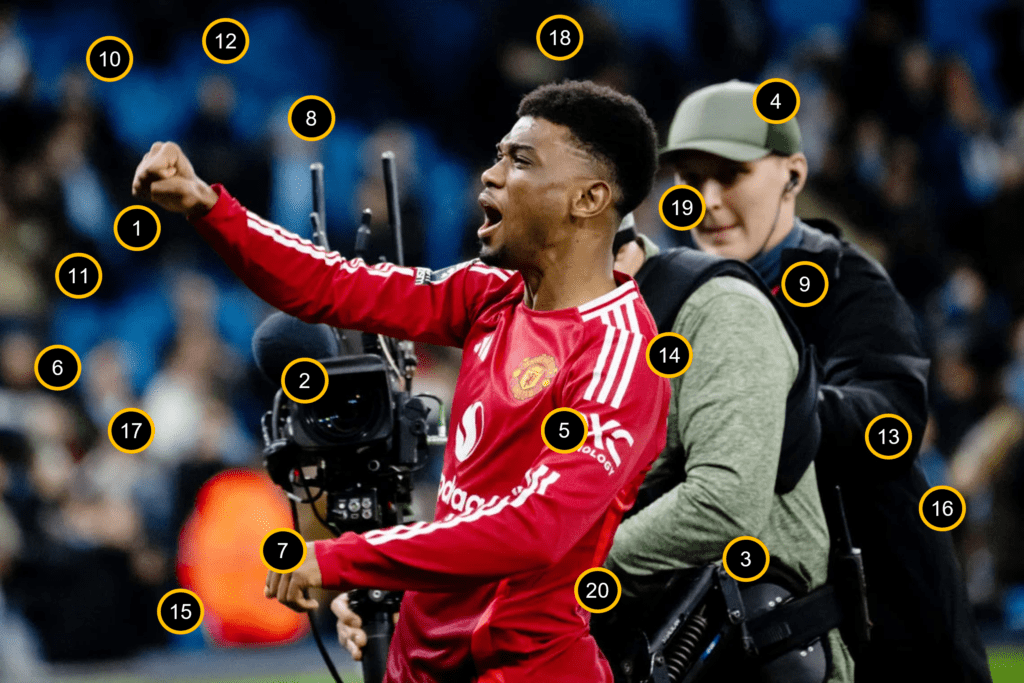
By leveraging this powerful data, AI and immersive technology ecosystem with SASE and advanced wireless connectivity, truly innovative and engaging experiences can redefine the fan growth potential for Premier League clubs. It becomes a growth enablere, in an ever-increasing, highly competitive global sports industry where all sporting codes are in the fight for relevancy and loyalty with Gen Z and Alpha fans.
Here are 20 AI-Powered, Data-Driven Immersive Fan Experiences Use Case examples demonstrating the ‘art of the possible’ for Premier League clubs:
- Augmented Reality (AR) Stadium Tours: Fans can use their smartphones to explore the stadium virtually, unlocking historical information, player interviews, and interactive 3D models.
- Mixed Reality (MR) Training Ground Experiences: Fans can step into the shoes of their favorite players, practicing drills and experiencing the intensity of training sessions in an immersive environment.
- Virtual Reality (VR) Match Day Experiences: Fans can feel the thrill of match day from the comfort of their homes, experiencing the atmosphere, crowd noise, and even interacting with virtual fans.
- AR Match Day Enhancements: Real-time AR overlays can provide in-depth match statistics, player performance data, and even personalized commentary during live games.
- VR Player Interviews: Fans can engage in immersive VR interviews with their favorite players, experiencing a more intimate and engaging conversation.
- AR Fan Rewards Programs: Gamified AR experiences can unlock exclusive rewards, merchandise, and VIP access based on fan engagement and loyalty.
- AR Merchandise Try-on: Fans can virtually try on official club merchandise using their smartphone cameras, ensuring the perfect fit and style.
- AR Fan Challenges: Interactive AR challenges based on player skills, such as shooting accuracy or dribbling challenges, with leaderboards and rewards.
- MR Fan Engagement Zones: Dedicated zones within stadiums featuring interactive MR experiences, allowing fans to participate in games, win prizes, and connect with other fans.
- Personalized AR Highlights: Fans can receive personalized AR highlights of their favorite players or key match moments delivered directly to their smartphones.
- AR Pre-Match Warm-up Experiences: Fans can virtually join the team’s pre-match warm-up, experiencing the intensity and excitement from a unique perspective.
- VR Stadium Redevelopment Plans: Fans can experience proposed stadium redevelopment plans in VR, providing valuable feedback and shaping the future of their club’s home ground.
- AR Fan Meet & Greets: Fans can participate in virtual meet & greets with players using AR technology, capturing personalized photos and videos.
- Personalized AR Fan Content: AI-powered tools can generate personalized AR content based on fan preferences, such as personalized player cards or custom AR filters.
- VR Match Day Hospitality: Enhance the VIP match day experience with immersive VR experiences, such as virtual tours of the stadium, player lounges, and exclusive behind-the-scenes content.
- AR Fan Contests: Interactive AR-based contests, such as “guess the player” or “predict the score,” with exciting prizes and exclusive rewards.
- MR Training Ground Simulations: Fans can experience the pressure of a penalty shootout or a crucial free kick in an immersive MR simulation
- Personalized AR Fan Journeys: AI-powered algorithms can create personalized AR fan journeys, guiding them through the stadium, highlighting key points of interest, and providing tailored experiences.
- AR Selfie with favourite player: Allow fans to have a VR selfie with their favourite football star as part of their pre-game experience. Already proving a ‘big hit’ with teenage fans in the NFL, NBA, MLB and NHL.
- AR Jersey Selfies: Enable fans to take a VR selfie at a stadium camera booth wearing their favourite club jersey. Already extremely popular with teenage hockey fans in the NHL leagues with instant distribution to fans’ personal social media platforms.
Key considerations for teenagers:
- Gamification: Make all experiences interactive and competitive, with leaderboards, rewards, and social sharing features.
- Social Integration: Seamlessly integrate with popular social media platforms to allow teenagers to share their experiences and connect with other fans.
- Cool Factor: Focus on cutting-edge technology and visually appealing graphics to make the experiences exciting and engaging.
- Simplicity: Ensure the experiences are easy to use and understand, with intuitive interfaces and clear instructions.
By focusing on these key considerations and tailoring the use cases to the specific interests and preferences of teenage football fans, The Premier League clubs can create a truly immersive and unforgettable fan experience.
The importance of a data strategy
To effectively leverage these immersive experiences, clubs must implement a robust data strategy:
- Data Collection: Collect first-party data from various sources, including club websites, mobile apps, social media platforms, and in-stadium sensors.
- Data Governance: Establish clear data governance policies to ensure data privacy, security, and compliance.
- Data Analysis: Utilize advanced analytics tools to gain insights into fan behavior, preferences, and engagement.
- Data Analysis: Utilize advanced analytics tools to gain insights into fan behavior, preferences, and engagement.
- Data Activation: Leverage data to personalize experiences, optimize marketing campaigns, and drive revenue growth.
The data centric football club
Leading clubs should look to pioneer Immersive Fan Experiences and build out Smart Venue capability in the next 12-18 months if they seek to achieve differentiated offerings to their fan base for social media fan expansion and new revenue growth.
Immersive fan experiences will become a central critical orchestrator value proposition in the future data-centric football franchise, powered by an effective SASE strategy.
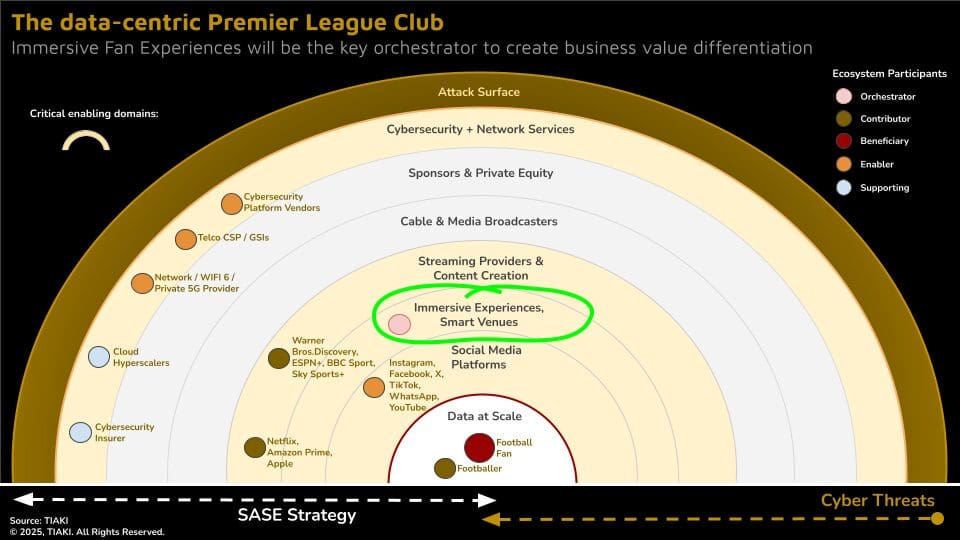
Additional monetization opportunities from immersive fan experiences
Additional monetization opportunities, not built into the business case include:
- Premium subscriptions: Offer exclusive access to premium immersive content and experiences.
- In-app purchases: Enable fans to purchase virtual goods, upgrades, and other digital assets within immersive experiences.
- Sponsorships and advertising: Integrate brands into immersive experiences through targeted advertising and sponsored content.
- Merchandise sales: Drive merchandise sales by offering AR try-on experiences and personalized product recommendations.
- Data licensing: License anonymized fan data to partners for market research and targeted advertising.
Powering business value
Our TIAKI model for Business Value Realization in football, powered by ‘data-at-scale’ is below. In the highlighted GREEN area we highlight the core components that will contribute to data use cases to create value including fan growth & retention, redefining new commercial rights deals and new digital revenues. New immersive fan experiences are central to many of these listed core components.
These include:
- Immersive ‘arena like’ fan experiences independent of location
- Real-time live analysis & predictions to educate & entertain
- Real-time AI-augmented game management decisions
- Personalized VIP commentary with AI audio doppelgangers
- Real-time avatars for unique customer service engagements
- Immersive real-time AR fan experiences in the stadium
- AR virtual jersey & selfies with favourite sports stars
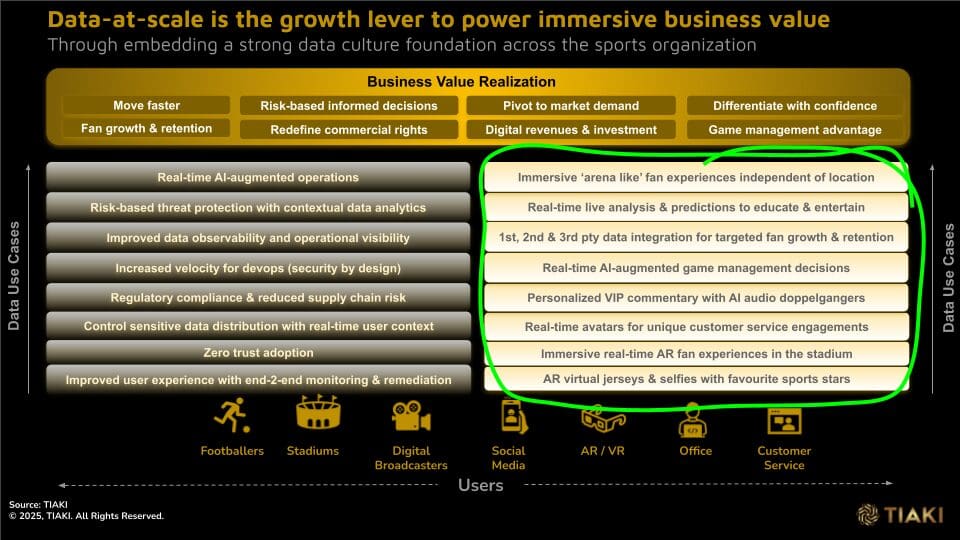
Focusing on value quantification immersive fan experiences:
- Measuring ROI: To ensure the long-term success of immersive technologies, it is crucial to demonstrate a clear return on investment (ROI).
- Clearly Defined Use Cases: Sports organizations must focus on developing clearly defined use cases for immersive technologies that are directly linked to measurable business outcomes.
- Value Quantification Frameworks: Implementing robust value quantification frameworks to track and measure the impact of immersive technologies on key performance indicators (KPIs), such as fan engagement, revenue generation, and operational efficiency.
Scaling revenue with 20 immersive football fan experiences for the top 9 revenue generating clubs in the Premier League
The challenge remains how to convert Premier League club social media growth into monetised opportunities that benefits the clubs their investors and their worldwide fan base.
Using Jan’25 market data, let’s now examine the opportunity roadmap comparing digital immersive fan engagements with actual 2024 Commercial + Broadcasting + Matchday revenues 6 plus analysing how this could compare with future Online Jersey Sales opportunities for 2025.
Our analysis focuses on the following clubs which are listed in order of largest social media followers in 2025. This provides an indication of the monetisation potential of the clubs’ first party data using the 20 immersive experience use cases:
- Manchester United
- Liverpool
- Manchester City
- Chelsea
- Arsenal
- Tottenham
- Newcastle
- Aston Villa
- West Ham
Monetised revenues were modelled for each of the 20 immersive use cases using conservative % adoption figures unique for each club. The revenue growth profile was then compared with potential online jersey sales that could be monetised against this same base foundation of social media followers, for each club.
- Clubs can achieve an average X2 more revenue from new immersive fan engagements compared to online jersey sales.
- Clubs can reach close parity for forecast immersive revenue with 2024 commercial and broadcasting actual revenues.
- The top 4 clubs will have significantly greater revenues from Immersive Fan experiences compared to commercial or broadcasting revenues within 2 years.
Our modelling suggests this equates to an average additional £168m immersive experiences revenue growth per club, compared to online jersey sales average at £79m per club. However, note this was an average across the 9 clubs.
The leading clubs could achieve additional immersive digital revenues in the range £300m+ with online jersey sales in the range £100m+.
Overall digital immersive revenues consolidated from the 9 chosen Premier League clubs could deliver a total revenue growth of £1,511m in the ‘25-26 season compared to forecast online jersey sales at £710m.
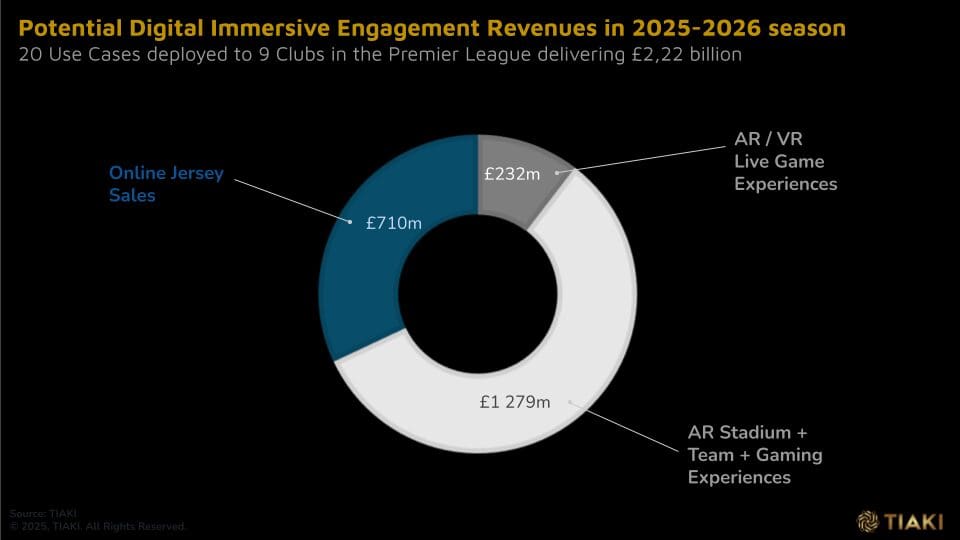
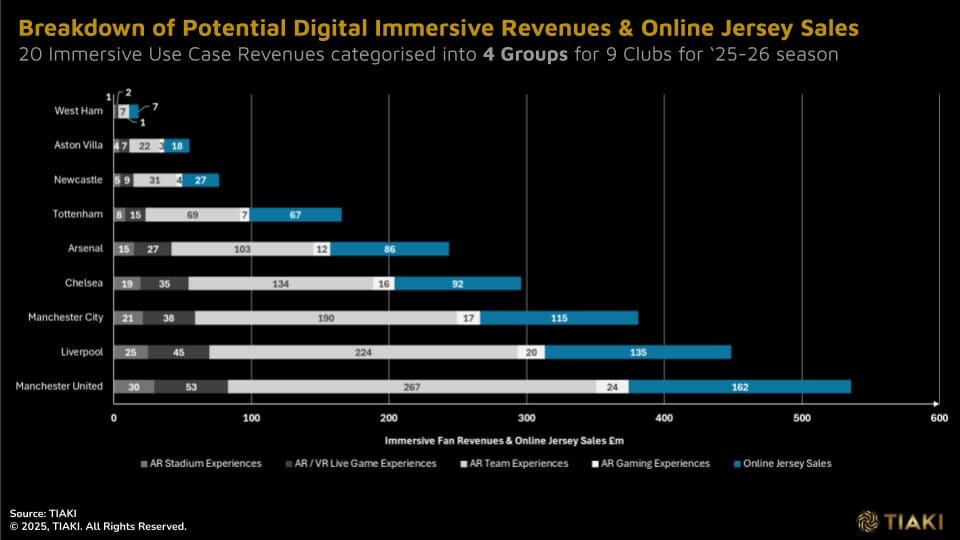
Value Creation:
Across the 9 clubs, the total aggregated immersive fan revenues averaged 2.1 times more than online jersey sales per club.
Group III had the HIGHEST forecast revenues:
- Consisting of Manchester United, Liverpool and Manchester City.
- Manchester United has the HIGHEST season ‘25-26 revenue forecast of all clubs:
- AR Stadium + Team + Gaming Experiences Revenue: £321m
- AR / VR Live Game Experiences Revenue: £53m
- Immersive Revenue Multiplier compared to Online Jersey sales: 2.3.
Group II had MEDIUM forecast revenues:
- Consisting of Chelsea, Arsenal and Tottenham.
- Chelsea has the HIGHEST season ‘25-26 revenue forecast in this group:
- AR Stadium + Team + Gaming Experiences Revenue: £169m
- AR / VR Live Game Experiences Revenue: £35m
- Immersive Revenue Multiplier compared to Online Jersey sales: 2.2.
Group I had the LOWEST forecast revenues:
- Consisting of Newcastle, Aston Villa and West Ham.
- West Ham has the MOST CONVERSATIVE season ‘25-26 revenue forecast of all 9 clubs:
- AR Stadium + Team + Gaming Experiences Revenue: £9m
- AR / VR Live Game Experiences Revenue: £2m
- Immersive Revenue Multiplier compared to Online Jersey sales: 1.6.
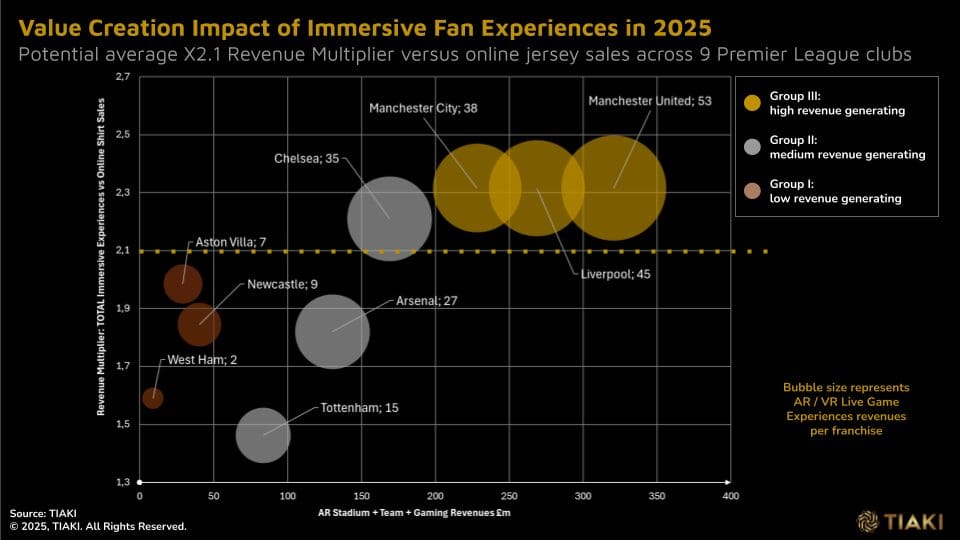
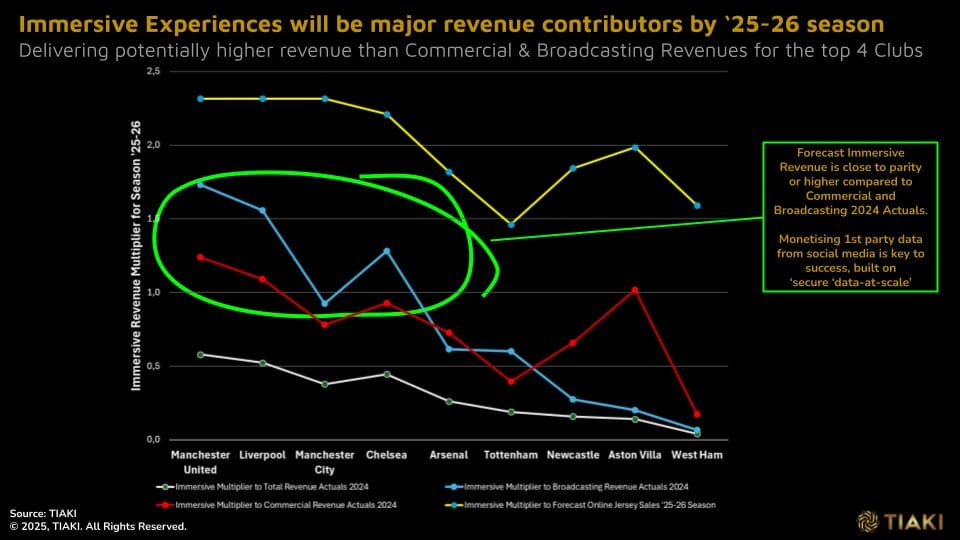
Our conservative modelling methodology:
Assumptions:
- Social media followers grew organically in the first 9 months of 2025 driven by data-driven marketing campaigns. Social media growth rates were club specific ranging from 10-15%
- Conservative fee paying charges were applied to the business case for this early adoption phase
- Fee per ‘25-26 season per Immersive app covering 18 of 20 unique use cases was charged as an upfront fee ranging from £2.50 to £5.00 depending on the specific application.
- Average application fee for the season duraton was only £3.50. Whilst it is recognised that this is a low charge per use, the intent was to keep the business case conservative. It is recognised that there is significant upside to these forecast revenue numbers for season ‘25-26.
- Conversion rates from the social media follower fan base to fee paying fans engaged in immersive experiences was assumed to be between 0.5 to 1% for 18 of the 20 use cases.
- Two highly compelling immersive apps were forecast to be highly popular [based on proven results in the NHL in 2023-2024]. The conversation rates were higher for:
- AR Pregame Selfies with Favourite Football Player (Use Case #19): conversion rate in the range 2 to 4 % depending on the club.
- AR Jersey Selfies (Use Case #20): conversion rate in the range 2 to 5% depending on the club.
- The comparative alternative to Immersive Fan Engagements was Online Jersey sales. We assumed a club specific conversation rate ranging from 0.6 to 0.9% of social media followers who purchased online jerseys priced in the range £60 to £85 depending on the club.
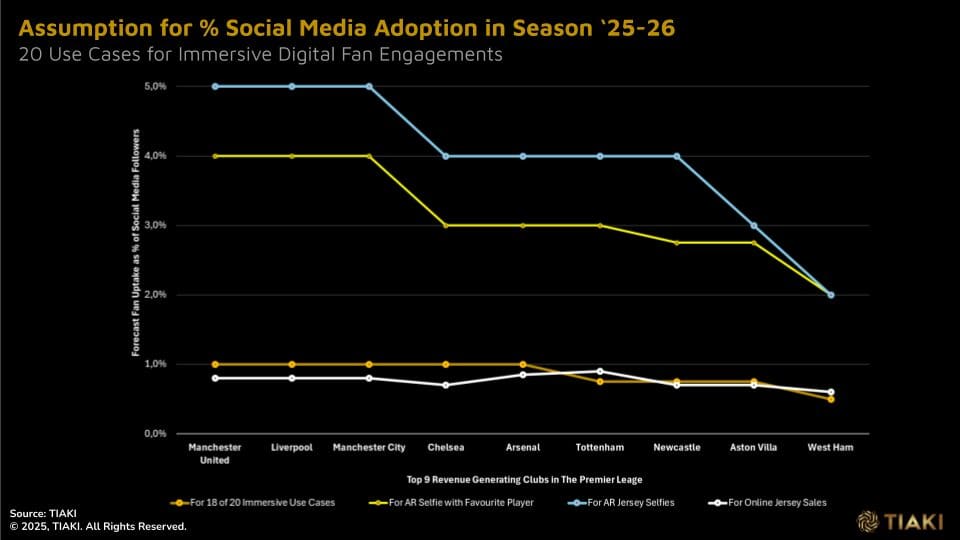
AI-augmented cybercriminals smell opportunity in private equity invested premier league clubs with high value rights deals
As the AI-augmented cybercriminals ramp up the volume and complexity of their data breach attacks, the cyber threat and consequential risks to new 2025 sporting business models have never been higher. The industrialisation of the cybercriminal ecosystem has created a 79% increase in ransomware attacks in the last 12 months 7 . More worryingly, the complexity and speed of the attacks are increasing significantly due to the deployment of AI tools by the cybercriminal.
The cybercriminals are opportunistic. They hunt for soft targets that are digitally and data immature, where there is significant investment from private equity and sports rights stakeholders to justify the criminals’ demands for high ransomware payouts following a data breach theft. The NBA’s $76 billion and NFL’s $111 billion sports rights deals, with increasing amounts of private equity investment and an explicit business goal to target data-driven fan growth in international markets, demonstrates exactly why the sports industry is becoming an increasingly attractive target for ransomware data breach attacks.
The cybercriminals are now ‘AI-weaponised’ to attack enterprises that have failed to put robust network cybersecurity postures in place. The cost of a data breach is significant. Our research suggests $6.1 million was the average cost of an enterprise data breach based on 200 selected enterprises with high-end monitoring 8 . In addition the risk of unrepairable brand damage for the sporting entity, the loss of trust from sporting fans and athletes from the theft of their personal data, and the exit of sponsors and investors, could quickly create an untenable, unrecoverable business.
Premier League clubs can pivot confidently to new Immersive Fan Experience business models with an effective Secure Access Service Edge (SASE) strategy
A SASE strategy is fundamental in reducing cybersecurity risk by ensuring C-suite ownership and awareness on the risk to the business. It is crucial to increase top-level buy-in to address the evolving cybersecurity threat landscape, especially with the transition to digital enterprise and next-generation technologies. Many sporting organisations are ill-prepared to respond to the evolving AI-augmented threats, including 3rd party supply chain risks, necessitating the need for the C-suite to elevate network cybersecurity as a senior leadership priority.
By making SASE and network cybersecurity a board-level agenda item, with proper oversight and governance, the franchises can align their leadership, their investment priorities and commit to enhancing digital resilience for new, innovative immersive fan opportunities.
This strategic alignment and prioritisation of risk-based controls and AI-automation, are essential components of a SASE strategy to effectively manage network cybersecurity risks whilst enabling monetisation of creative immersive fan use cases and data assets.
SASE, secure data-at-scale and immersive ecosystem partnerships can power new ‘immersive experiences’ to be the cornerstone for revenue growth for Premier League clubs within 2 years
In today’s digital, data-driven economy, Premier League clubs should seek to pioneer adoption of cloud-native ecosystems and GenAI capabilities as they seek new AI powered immersive revenue streams, invest in innovative hyper-personalised engagements with their fans and upgrade stadium physical infrastructure to become digitally connected, ‘smart venues’. This is needed to grow a highly loyal, digitally engaged fan base across the globe, willing to pay for immersive sporting experiences.
This shift will fundamentally transform the way footballers, coaches, journalists, and fans experience football in the next 2 years. Secure ‘data-at-scale’ will be the ‘lifeblood’ of this new football reality. The criticality of a robust network cybersecurity posture to protect against the cybercriminal and enable ‘data at scale’ for new monetisation opportunities, is not yet fully recognised, which is creating significant business risk. This risk can be reduced with an effective SASE strategy.
However, implementing a comprehensive SASE strategy across all aspects of a football club operating model should not be regarded as a defensive, technology centric cost burden. With correctly deployed SASE data use cases, it becomes a fundamental business enabler to catalyse immersive revenue multiplier growth.
Seize the opportunity to monetise social media 1st party data through secure, immersive fan engagements.
By shifting to become data-centric, content-generating operations, Premier League clubs have seemingly limitless creative possibilities to reimagine personalised, relevant shared immersive experiences for their existing and prospect digital fans across the globe. Data-at-scale is the lifeblood of these pioneering new ambitions. SASE adoption will ensure this data is secure for revenue growth and value creation.
- Only 2% of UK sports properties expecting major media rights growth in next five years – SportsPro (sportspromedia.com)
- Only 2% of UK sports properties expecting major media rights growth in next five years – SportsPro (sportspromedia.com)
- Impact of Digital Transformation on Sporting Organizations – iSportConnect
- Only 2% of UK sports properties expecting major media rights growth in next five years – SportsPro (sportspromedia.com)
- Fan Engagement: football clubs consider themselves content providers. They need to start acting like it | FT Strategies – The specialist Media consultancy from the Financial Times
- Deloitte Football Money League 2025
- Orange Cyberdefense Executive Navigator 2024: Research-based cybersecurity insights to drive smart business decisions
- Orange Cyberdefense Security Navigator Report 2024: Research-based cybersecurity insights to drive smart business decisions
About the Author:

David Andrew
Founder & Managing Partner
www.tiaki.ai
david.andrew@tiaki.ai


David is the Founder & Managing Partner at TIAKI, a niche consulting practice helping executive leadership in sport make confident, informed decisions on their risks, investments and business outcomes powered by secure ‘data-at-scale’. He collaborates with bold and determined leaders in the sports ecosystem to define their data, AI and cybersecurity strategies to deliver sustainable value.
David’s vision for TIAKI is to empower sports franchise CEOs, leadership teams, sports media broadcasters and investors in the global sports industry with strategic advisory frameworks to deliver secure, pioneering digital fan experiences and new ecosystem business models to achieve breakthrough returns.
David has over 20 years of strategy and technology enabled business transformation experience, providing consulting expertise in cloud native technologies, data strategy, digital business enablement and cybersecurity strategy. He is passionate about helping talented leadership teams succeed in securely growing their differentiated business models in the data-driven, digital sports economy.
Based in Stockholm, David previously worked for IBM Consulting, EY, Accenture Strategy and Orange Business. He studied Chemistry at Durham University and holds an MBA from Trinity College, Dublin Business School.
Copyright © 2025 TIAKI.
All rights reserved. TIAKI and its logo are registered trademarks of TIAKI.
Search
